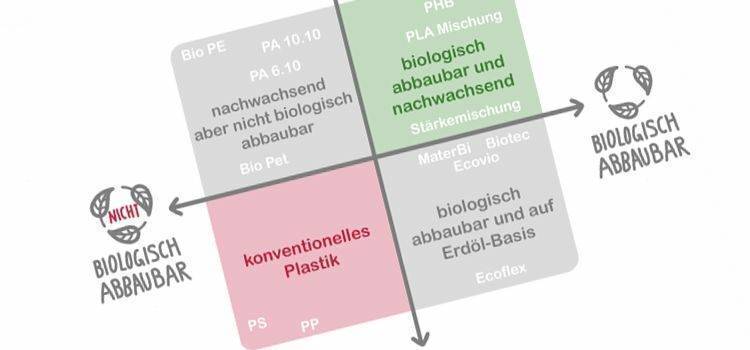
Bioplastic - What is it?
How does biological plastic differ from conventional plastics?
Bioplastic or natural plastic products are becoming more and more common. Be it bottles, crockery, cutlery or even carrier bags made of bioplastics. But what is behind the term "bioplastic"?
The term "bioplastic" or "bioplastic" is very broad. There is no single definition for it. All products that either have a renewable content, i.e. consist of renewable raw materials, or are biodegradable can be referred to as bioplastics. Only one of the two criteria must be met. There is bioplastic that is chemically identical to synthetic plastic, but it is also obtained from plants, such as bio-PE or bio-PET. This is not biodegradable. Conversely, there are also biodegradable plastics made from crude oil, so-called polyethers. But a plastic with only 20% renewable content, for example, can also be called a bioplastic. For this reason, there are a wide variety of forms of bioplastics with different properties (see graphic).

The term "bioplastic" is therefore very confusing, which is why we, as bioplastics manufacturers, have decided to give our plastic a different name: natural plastic. Because our natural plastic combines both aspects: compostable and renewable.
What does biologically or ecologically degradable plastic mean?
The natural plastic from NaKu is ecologically degradable plastic, ie compostable according to the DIN standard EN 13432 and thus fulfills the requirement to become biogenic mass again within 90 days. The natural plastic decomposes completely into organic basic substances (water, CO2, biomass). How long the degradation process takes depends primarily on the wall thickness of the compostable plastic and the composting (heat, moisture, bacteria, fungi, ...).
As an example you can take a closer look at the NaKu Sackerl, an ecologically degradable plastic bag:
In an industrial composting plant there are optimal conditions for composting. It's always around 60°C there. There are many bacteria that decompose biodegradable plastics. The compost is also turned over regularly. Under these conditions, the dismantling process of the NaKu bag takes about three to five days.
In agricultural compost, on the other hand, which is turned over at regular intervals, it takes 9 - 12 weeks in warm weather for our NaKu bags to disappear.
What is PLA?
Unlike our bags, our bottles are not made from corn starch but from PLA (polylactic acid). We use sugar as a raw material for the PLA plastic. However, cornstarch or whey can also be used to make PLA plastic. PLA has properties similar to PE or PET and can therefore easily replace them. The difference lies in the fact that PLA is a compostable plastic and is therefore less of a burden on the environment than, for example, polyethylene.
We also regularly post on Instagram on these topics using the following #hashtags:
#bioplastics #natural plastics #bioplasty #noplasticbottles #organic products #nakustattplastic #sagnichtplasticzumir #biobottle #austria #eco #green #nature #plants
#noplastic #noplasticbags #noplasticchallenge #noplasticproducts #plasticfree #plasticfree #plasticfreeliving #oilfree #plasticban #plasticfreelife #plasticfasten #plasticsaving #noplastic #noplasticwaste #noplasticmore #noplastic #plasticproblem #microplastic
#climatechange #climate crisis #thereisnoplanetb #savetheplanet #climate protection
#biodegradable #biodegradablepackaging #compostable #recyclable #recycling #red
#sustainable #sustainability #sustainable living #circular economy #circulareconomy #zeroplastic
